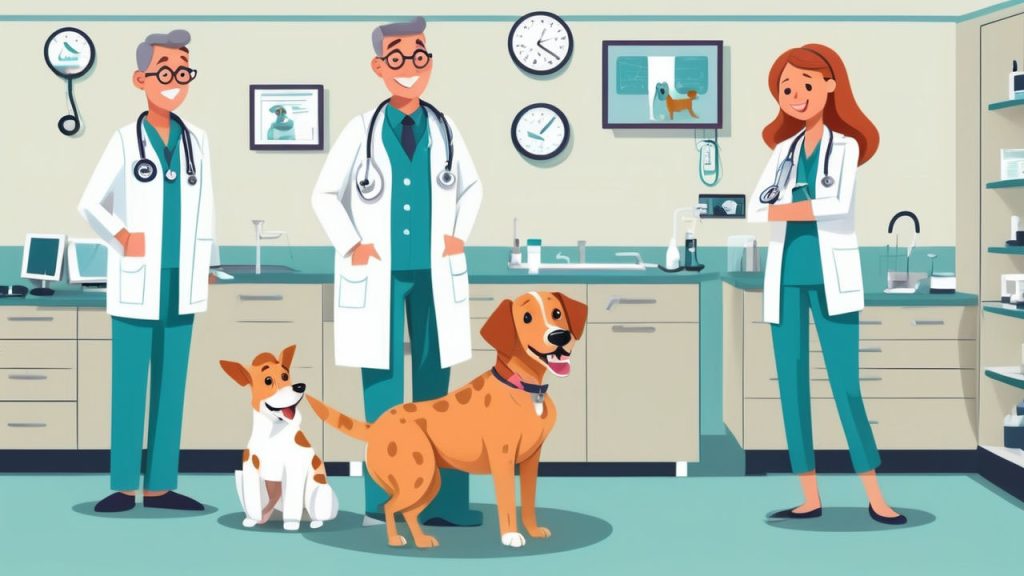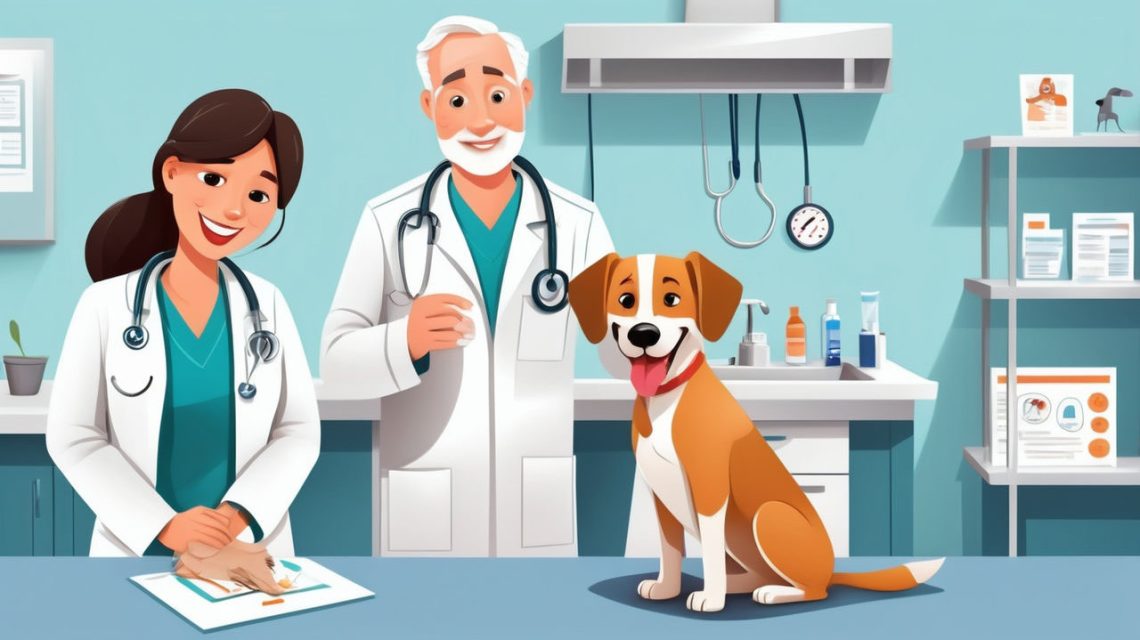Dog Check-Ups: Essential Vet Visits for a Healthy Pet
As a dog owner, regular dog check-ups are crucial to ensuring your pet lives a long, healthy, and happy life. These routine vet visits do more than just monitor your dog’s growth—they help prevent serious health issues, detect potential problems early, and provide an opportunity to ask your vet questions about your dog’s care. By making check-ups a priority, you’re giving your dog the best chance at a healthy future.
In this article, we’ll walk through the importance of dog check-ups, what typically happens during these visits, and how to stay on top of your dog’s health needs throughout their life. Let’s dive in!
Why Regular Dog Check-Ups Are Important
Routine vet visits play an essential role in keeping your dog healthy. Even if your dog seems perfectly fine, check-ups can help identify underlying issues that may not show obvious symptoms. Early detection is key in managing health problems before they escalate.
1. Preventive Care for Long-Term Health
Preventive care is one of the biggest reasons for regular dog check-ups. During these visits, your vet will assess your dog’s overall health, including weight, diet, and behavior. Vaccinations, flea and tick prevention, and heartworm medications are all part of keeping your dog protected from common health risks.
- Tip: Stick to a schedule of annual or biannual check-ups to ensure your dog stays up to date on preventive treatments.
2. Early Detection of Health Issues
Many health problems, such as dental disease, arthritis, or heart conditions, don’t show obvious symptoms in their early stages. Routine check-ups allow vets to spot potential issues before they become more serious. Catching a problem early makes treatment easier and more effective, helping your dog avoid unnecessary pain or complications.
- Tip: If you notice any changes in your dog’s behavior or energy levels between check-ups, schedule an appointment to address these concerns early.
3. Tailored Advice for Your Dog’s Needs
Your vet can provide specific advice on nutrition, exercise, and grooming that suits your dog’s breed, age, and lifestyle. Regular check-ups are also a great time to discuss any concerns about your dog’s behavior, diet, or any unusual symptoms. This personalized care helps you make the best decisions for your dog’s overall well-being.
What Happens During a Routine Dog Check-Up
A dog check-up is more than just a quick once-over. It’s a thorough evaluation of your dog’s physical and sometimes mental health. Here’s what you can expect during a typical vet visit.
1. Physical Examination
The vet will start with a head-to-tail physical examination. This includes checking your dog’s ears, eyes, mouth, and skin for any signs of infection, irritation, or abnormalities. They’ll also examine your dog’s heart and lungs using a stethoscope to ensure everything sounds normal. The vet may feel your dog’s abdomen to check for any internal issues like swollen organs or tumors.
2. Weight and Body Condition
Maintaining a healthy weight is essential for your dog’s overall health. Your vet will weigh your dog to ensure they’re in the right range for their breed and age. They’ll also assess body condition to see if your dog needs to lose or gain weight.
- Tip: Ask your vet for feeding recommendations based on your dog’s age, breed, and activity level. Adjusting your dog’s diet can prevent obesity or malnutrition, both of which can lead to long-term health problems.
3. Dental Health Check
Dental health is often overlooked, but it’s critical to your dog’s well-being. The vet will check your dog’s teeth and gums for signs of plaque buildup, tartar, or gum disease. Dental issues can lead to serious problems like infections or tooth loss if left untreated. Regular cleanings and at-home care are essential to maintaining oral health.
- Tip: Ask your vet about how to brush your dog’s teeth at home or what dental chews can help reduce plaque.
4. Vaccinations and Booster Shots
During routine check-ups, your vet will ensure your dog is up to date on their vaccinations. Puppies need a series of shots to protect against diseases like distemper, parvovirus, and rabies, while adult dogs require regular booster shots to maintain immunity.
- Tip: Keep a record of your dog’s vaccination schedule so you can stay on top of their health care needs.
5. Parasite Prevention
Fleas, ticks, and worms are more than just nuisances—they can cause serious health problems for your dog. Your vet will recommend parasite prevention treatments tailored to your dog’s environment and lifestyle. They may also perform tests to check for heartworm, intestinal worms, or other parasites.

How Often Should You Schedule Dog Check-Ups?
The frequency of dog check-ups depends on your pet’s age, breed, and health status. As a general rule:
- Puppies: Puppies should visit the vet every 3 to 4 weeks for vaccinations and growth monitoring until they are about 16 weeks old.
- Adult Dogs: Healthy adult dogs typically need annual check-ups. These visits help ensure they’re maintaining a healthy weight and staying current on vaccines and preventive treatments.
- Senior Dogs: Older dogs may require more frequent visits—typically every 6 months—as they are more prone to age-related health issues like arthritis, diabetes, or heart disease.
- Tip: Dogs with chronic conditions or ongoing health concerns may need check-ups more frequently. Discuss with your vet how often your dog should be seen based on their individual health.
Signs It’s Time to Visit the Vet Between Check-Ups
While regular check-ups are important, sometimes your dog may need to see the vet between visits. Pay attention to any sudden or unusual changes in your dog’s behavior, appearance, or energy levels.
1. Changes in Eating or Drinking Habits
A sudden loss of appetite, excessive thirst, or difficulty eating can signal an underlying health issue. If your dog is eating less, drinking excessively, or showing signs of nausea, it’s time to call the vet.
2. Lethargy or Sudden Fatigue
If your normally active dog becomes unusually tired or lethargic, it could indicate anything from minor discomfort to a serious illness. Lethargy should always be investigated, especially if it lasts more than a day.
3. Vomiting or Diarrhea
Occasional vomiting or diarrhea may not be cause for alarm, but frequent episodes or any signs of blood should prompt an immediate vet visit. Dehydration can quickly become a risk in these cases.
How to Make Dog Check-Ups Stress-Free
Some dogs get anxious when it’s time for a vet visit. Fortunately, there are ways to make the experience smoother and less stressful for both you and your pet.
1. Familiarize Your Dog with the Vet Office
Start by taking your dog to the vet clinic for non-medical visits. Allow them to sniff around the waiting room, meet the staff, and become familiar with the environment. This can help reduce fear and anxiety when it’s time for an actual check-up.
2. Use Positive Reinforcement
Reward your dog with treats and praise before, during, and after the vet visit. Positive reinforcement helps create a positive association with vet visits, making future trips easier.
3. Bring Comfort Items
Bring your dog’s favorite toy or blanket to the vet visit. Familiar smells and items can help your dog feel more secure and relaxed.
FAQs About Dog Check-Ups
How often should my dog have a check-up?
- Most adult dogs should have an annual check-up, but puppies and senior dogs may need more frequent visits. Your vet can recommend the best schedule based on your dog’s health and age.
How can I prepare my dog for a vet check-up?
- Bring your dog’s health records, stay calm to avoid stressing your dog, and bring treats or toys to keep them relaxed during the visit.
What happens during a routine dog check-up?
- The vet will perform a full physical exam, check your dog’s weight, dental health, and update any necessary vaccinations or parasite prevention.
Are vaccinations necessary for adult dogs?
- Yes, adult dogs still need vaccinations, especially boosters for core vaccines like rabies and distemper, to maintain immunity against serious diseases.
How much does a typical dog check-up cost?
- A routine check-up can cost between $50 to $150, depending on location, services provided, and the clinic’s pricing structure.


